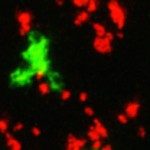Link to Pubmed [PMID] – 10878349
J. Immunol. 2000 Jul;165(2):760-7
We have analyzed the hierarchy of epitope-specific T cell populations during a primary and a secondary CD8 T cell response. MHC-peptide tetramers were used to track the in vivo kinetics of expansion of T cell populations specific for two Kd-restricted epitopes simultaneously presented by a murine tumor cell following primary or recall immunizations. Individual syngeneic mice generated remarkably different primary CTL responses, as reflected by up to 60-fold differences in the relative contribution of each peptide-specific T cell population to the overall response. In these primary immunizations, the CTL dominance was not dictated by the respective abundance of the presented epitopes. In sharp contrast, the secondary response was systematically associated with a selective expansion of the same epitope-specific population both in vitro and in vivo. In vitro experiments indicated that the extent of expansion of each epitope-specific memory population is modulated by the epitope density. We conclude that, at least for this set of epitopes, the CTL hierarchy is not controlled by the same parameters in a primary vs a secondary response.

